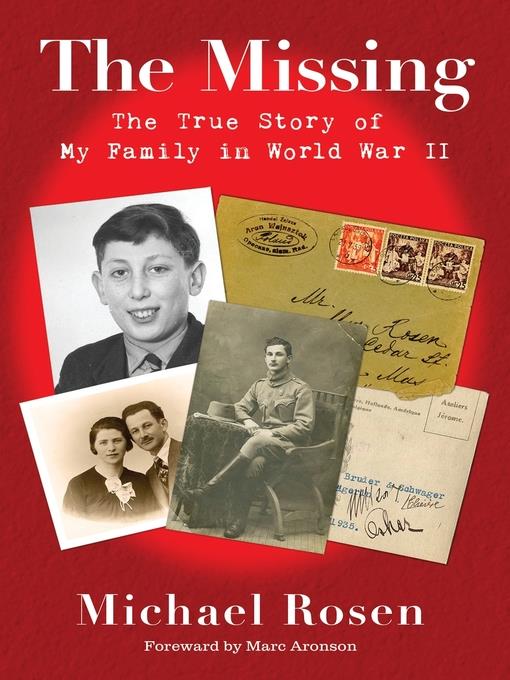
The Missing
The True Story of My Family in World War II
کتاب های مرتبط
- اطلاعات
- نقد و بررسی
- دیدگاه کاربران
نقد و بررسی

June 1, 2020
Born in England just after World War II, young Rosen grew up hearing references about relatives who existed before the war but had disappeared by the time it ended. There were great-aunts and great-uncles and their families who had lived in France and Poland. His dad knew their names and a bit about them. He assumed they died "in the camps." At first the child Michael didn't understand what that meant. As he learned more about the Holocaust, he became determined to find out about his lost relatives. He did extensive research, gathered small clues, and began to dig deeper, becoming consumed by the quest throughout his life. His account includes lots of disappointments and dead ends as well as some remarkable finds that led to information and some answers about missing relatives from both France and Poland. He provides photos and letters that bring these lost souls to life. Speaking in the first person, directly to readers, Rosen explains the unexplainable in simple but not simplistic language, presenting facts without sugarcoating them or underestimating children's ability to comprehend. He includes poems, some written over many years and some written for this book, expressing his deeper feelings regarding his long search and its mostly devastating results. He links history to modern-day hatreds and reminds his readers of the exhortation "Never again." "Today; One Day," a poem of pain and hope, makes a poignant close. An important work that is immensely personal, powerful, and heart-wrenching. (foreword, family tree, photos, documents, bibliography, index, acknowledgements) (Memoir/history. 10-adult)
COPYRIGHT(2020) Kirkus Reviews, ALL RIGHTS RESERVED.

August 1, 2020
Gr 6-9-Rosen chronicles his quest to uncover the truth about his family history and the many theories of what happened to some of his relatives after World War II. This short book is written in chronological order, and most chapters end with a poem or part of a poem by Rosen. Although a lot of specific information regarding the war, especially from an English perspective, will be novel to most readers, most of it is specific to the author and his family. The abridged poems are moving and complement the topic covered in the previous chapter. In fact, the poetry could stand alone as an emotional literary work, instead of a narrative device that incorporates the granular details of discovering the author's family history. The language is simple, and the content is covered in a way that is not traumatic for young readers. The back matter, which includes further reading, photos, and letters, is a helpful resource. VERDICT Recommended for upper elementary or middle school libraries that need to expand their World War II collection.-Samantha Hull, Ephrata H.S., PA
Copyright 2020 School Library Journal, LLC Used with permission.

August 31, 2020
This poignant memoir documents the author and poet’s genealogical detective work to discover his relatives’ fates during WWII. Growing up in England, the former British children’s laureate heard about great-aunts and -uncles in France and Poland who had disappeared by the end of the war. As an adult, Rosen becomes determined to find out what had become of them. In the first-person, the author compellingly illustrates how the Nazis sought not only to extinguish the Jewish populace, like Rosen’s family, in concentration and death camps, but also aimed to erase their existence from memory—and that discovery spurs him onward, through family interviews and discovered letters. Alternating between prose and poetry, the accessible narrative includes poignant poems that underscore the search and deepen understanding of both Rosen’s family and his drive to uncover the truth. Supplemented by black-and-white photographs, a comprehensive family tree, and an extensive list for further reading, this multifaceted tome offers a potent, personal look at family history and the Holocaust, with a rousing call against ongoing prejudice and contemporary crises. Ages 10–14. (Oct.)■

























دیدگاه کاربران